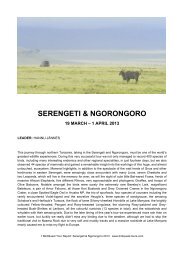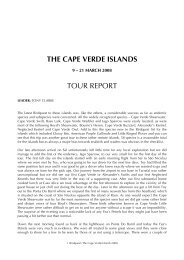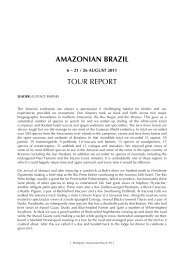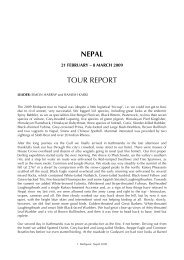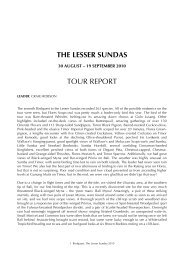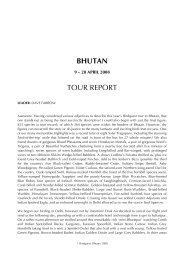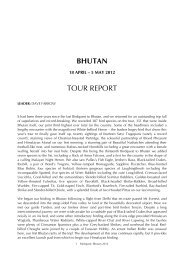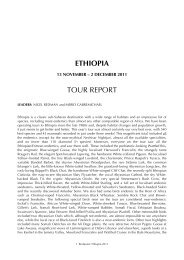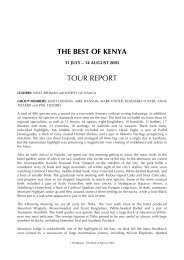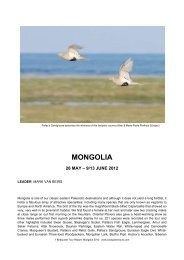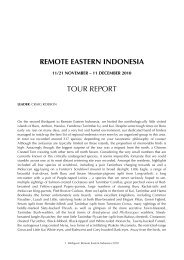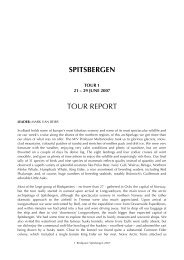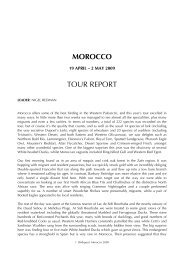Download Full Tour Report 1202kb - Birdquest
Download Full Tour Report 1202kb - Birdquest
Download Full Tour Report 1202kb - Birdquest
You also want an ePaper? Increase the reach of your titles
YUMPU automatically turns print PDFs into web optimized ePapers that Google loves.
ANHINGIDAE<br />
Anhinga (American Darter) Anhinga anhinga: A few sightings of this non-buoyant, snake-necked<br />
bird.<br />
ARDEIDAE<br />
Rufescent Tiger-Heron Tigrisoma lineatum: Two sightings near Romero and a third was seen really<br />
well at Cocha Camungo. Tiger-herons and bitterns are the only ones in the family that<br />
don’t breed in colonies.<br />
Fasciated Tiger-Heron Tigrisoma fasciatum: A bird of rushing rivers and streams, with over a dozen<br />
seen in the rocky headwaters of the upper Rio Madre de Dios around Amazonía and<br />
Pantiacolla.<br />
Agami Heron Agamia agami: We enjoyed superb studies of a fishing bird successfully spearing a fish<br />
on the banks of Cocha Blanco.<br />
Black-crowned Night-Heron Nycticorax nycticorax: A single individual was seen at Huacarpay lake<br />
near Cusco. A cosmopolitan species, here of the American race hoactli.<br />
Striated Heron Butorides striatus: Regular sightings, especially along lake edges.<br />
Cattle Egret Bubulcus ibis: Three were seen near Cusco and around Puerto Maldonado we saw small<br />
numbers. The nominate race of this highly successful species apparently invaded South<br />
America from Africa in the late 19th century, one of the most spectacular examples of<br />
avian range expansions in historic times.<br />
Cocoi Heron (White-necked H) Ardea cocoi: Frequently seen on the Manu and Madre de Dios<br />
rivers. This species is one of the primary predators of young Black Caimans on oxbow<br />
lakes, although in recent decades humans have been much more detrimental to this<br />
endangered crocodilian.<br />
Great Egret (G White E) Ardea alba: Regular sightings along the Manu and Madre de Dios rivers.<br />
Formerly often separated in the monotypic genus Casmerodius.<br />
Capped Heron Pilherodius pileatus: We had a couple of excellent sightings of this exquisite river<br />
heron. The buffy wash on the breast is thought to come from the powder-downs. The<br />
generic name is entirely derived from ancient Greek: pilos = cap, erodios = heron.<br />
Snowy Egret Egretta thula: The most abundant heron seen on our river journeys.<br />
Little Blue Heron Egretta caerulea: Five were seen during the trip, during the river journeys but also<br />
one in the highlands at Huacarpay. Formerly often placed in the genus Florida.<br />
THRESKIORNITHIDAE<br />
Puna Ibis Plegadis ridgwayi: Numerous in agricultural fields in the sacred valley and at Huacarpay<br />
Lake. This bird is named after Robert Ridgway, US ornithologist and author of “The Birds<br />
of North and Middle America”, 1901.<br />
Green Ibis Mesembrinibis cayennensis: Our afternoon at Cocha Blanco produced good views of four<br />
of these forest ibis. The name ‘cayennensis’ (as well as similar names such as cayana for<br />
other species) refers to Cayenne or French Guyana, an epithet that in early ornithology<br />
usually indicated a species of otherwise unknown provenance.<br />
CICONIIDAE<br />
Wood Stork Mycteria americana: A total of 5 birds were seen both foraging and in flight during our<br />
boat journey to Manu Wildlife Centre.<br />
CATHARTIDAE<br />
Black Vulture Coragyps atratus: Ever present near human settlements.<br />
Turkey Vulture Cathartes aura: In the Manu lowlands small numbers were seen along the Madre de<br />
Dios, but this species is seemingly absent or at best rare along the Manu River,<br />
undoubtedly due to the absence of open terrain required by this species. Small numbers<br />
were also seen in cleared areas in the foothills and along the coast.<br />
12 <strong>Birdquest</strong>: The Manu 20011



